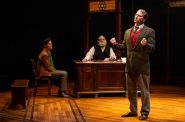Theisen, Beaumarchais, Rossini and Mozart
Rossini’s The Barber of Seville and Mozart’s The Marriage of Figaro rank high among the most-performed operas. Both are brilliant comedies, and both derive from brilliant plays by Beaumarchais. Marriage was a sequel to Barber, and the clever Figaro is a central character in both.
You’d think that some company would have staged the two operas in the same season, as a cycle. But as far as director Bill Theisen has been able to determine, Milwaukee’s Skylight Opera Theatre will be the first. That company builds everything from scratch around a director’s concept, and casts from a relatively tight circle of singers who understand its theatrical values. That gives the Skylight the latitude to conceive two very different operas as chapters in one story.
Barber will open the Skylight season on Sept. 18 and run through Oct. 4. Marriage is set for Jan. 29-Feb. 14.
“At the Skylight, we have the luxury of unified productions,” Theisen said. “We can do them as Figaro’s story.”
Just to refresh your memory: Giacomo Rossini’s 1816 Barber relates how the clever Figaro, a pushcart barber, meets a lovelorn count, Almaviva, and helps him win the hand of the lovely Rosina. To do so, the commoner and the noble must hoodwink the girl’s aging guardian, Bartolo, who has romantic designs of his own on his young ward.
Mozart’s Marriage picks up Almaviva and Rosina after years of married life. Figaro, now Almaviva’s valet, is about to marry Rosina’s personal maid, the cute, bright Susanna. Almaviva, once so smitten as to go to absurd lengths to win Rosina’s hand, has become an open and unrepentant roué. To everyone’s shock and dismay, he declares his intention to apply to Susanna a long-forgotten rule allowing the lord of the manor to bed down servant girls on the eves of their marriages. Hi-jinks and a little heartbreak ensue.
The vocal parts don’t all match up, and the business of singing is what it is, so the casts don’t transfer 100 percent. But Theisen does have a Figaro for all seasons in Skylight veteran Andrew Wilkowske, who is based in Chicago.
“Not every baritone can sing both roles,” Theisen said. “Andy can. When he said yes, I knew this would work for us.”
“I want them to see where their world begins,” Theisen said. “I also cast the shows so that characters could plausibly age as the same people from one opera to the next.
“‘Barber’ is youth, the joy of freedom and frivolity. Then we become adults and reality sets in. ‘Marriage’ is not farce. It has laughs and charming characters, but they’ve grown up — some of them in not very nice ways.”
The music reflects that difference. Rossini’s is relentlessly effervescent and harmonically and structurally simple. Mozart enjoyed robust buffa as much as the next guy, and plenty of that is in his score. But he is also much more nuanced; his music serves a moral point. The farce stops in its tracks for the Countess’ “Dove sono,” an exquisite soliloquy in which she expresses her hurt, humiliation, and deep regret at the loss of love. (The link is to Renee Fleming singing in Italian; all Skylight shows are in English.)
Theisen and his designers placed the two operas in the usual Seville. They settled on 1785 for Barber and 1795 for Marriage. A lot can change in 10 years. The French Revolution, for example, sent tremors throughout Europe; a little rumble of it extends to Seville. It also shook the fashion world, as aristocratic panniers gave way to the more romantic, unstructured Empire gown.
“The architecture pretty much remains the same,” Theisen said. The change in the look of the shows is “all about the clothes.”
Change in the spirit of the shows has mostly to do with the changed relationship between Figaro and Almaviva. In Barber, Figaro is a free spirit, a tradesman for hire living on his wits. As a conniving co-conspirator, he is almost the nobleman’s equal. In Marriage, he has become a common servant, and the Count reminds him of his station in an outrageous way.
Figaro doesn’t take it lying down, any more than the merchant classes of Europe took aristocratic clampdowns on their freedom and power lying down. Taken together, these charming, delightful, hilarious operas aren’t just about charm, delight and hilarity. As artificial as they are, they tell us something about how the real world works.
What: Rossini’s The Barber of Seville
Where: Broadway Theatre Center Cabot Theatre, 158 N. Broadway
When: 7:30 p.m. Friday and Saturday, 2 p.m. Sunday (Sept. 18-20) and Wednesdays and Friday through Sundays through Oct. 4
How Much: $23-$62 Friday and Saturday evenings; $20-$57 weekdays, matinees and Sundays; call the Broadway Theatre Center box office, 414- 291-7800.
Cast and Credits
Figaro, Andrew Wilkowske; Count Almaviva, Gregory Schmidt; Bartolo, Jason Budd; Rosina, Katherine Pracht; Basilio, Daniel Klein; Ambrogio, Bryce Lord; Berta, Kathy Pyeatt; Chorus: Justin Deehr, Gustavo Chaviano, Jonathen Stewart, Emmitt Morgans, Eric Nelson, Doug Clemens, David Flores, Peter Voight; Music Director, Pasquale Laurino; Director, William Theisen; Costume Designer, Carol Blanchard; Lighting Designer, Kurt Schnabel; Set Designer, Van Santvoord
Theater
-
‘L’Appartement’ Is a Mind-Bending Comedy
 Mar 25th, 2024 by Dominique Paul Noth
Mar 25th, 2024 by Dominique Paul Noth
-
‘The Mountaintop’ Offers Very Human Martin Luther King Jr.
 Mar 11th, 2024 by Dominique Paul Noth
Mar 11th, 2024 by Dominique Paul Noth
-
‘The Chosen’ Is Subtly Powerful Drama
 Mar 10th, 2024 by Dominique Paul Noth
Mar 10th, 2024 by Dominique Paul Noth




















